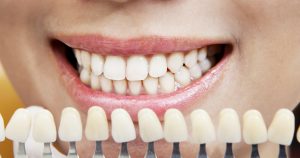Do you have bonded teeth and are interested to know: can you whiten composite bonding at home? Maybe you’re getting dental bonding done soon, or you’ve just had it done. Perhaps, you’ve had it for a while. Whatever your case may be, we aim to make sure you have all the facts before you try whitening bonded teeth.
In this article, we’ll answer some common questions, including:
- What is dental bonding?
- How does bonding respond to colour?
- Can you whiten composite bonding?
- When should I whiten my bonded teeth?
- How do you remove stains from composite bonded teeth?
By answering these questions, we hope to give you clarity on whitening bonded teeth.
Since composite is nonporous and therefore responds differently than natural teeth, composite bonding cannot be whitened. There are, however, a few things you can do, which we will discuss in this article.
The best option may be to have your teeth professionally cleaned and whitened with a dentist-approved teeth whitening product such as Smile White. If then the composite’s colour does not match the whitened natural teeth, the dentist may suggest polishing or replacing it. However, each situation is unique, and you should always consult your dentist for individual advice.
In This Article
What is dental bonding?

Composite bonding is where a dentist attaches tooth coloured composite resin to one or more of your natural teeth and then shapes it to restore the natural look of each tooth. It is used on cracked or chipped teeth, or to fill gaps between the teeth. You can use composite bonding to not only cover up damage to the teeth, but also to change the overall shape and colour of your teeth.
This method of tooth restoration is mostly used to make minor cosmetic corrections to your smile. It’s also a cheaper option than veneers or crowns, and much less invasive. Veneers and crowns usually require that some of your enamel be removed to make room, which is an irreversible process.
Why would someone need to get teeth bonding?
There are a few issues that bonding can help with aesthetically, including:
- Diastema (gaps between teeth)
- Cracked or chipped teeth
- Discoloured teeth
- Teeth that are crooked or misshapen
Teeth bonding is meant to even out the size, shape, or colour of teeth, or cover any minor cosmetic issues in someone’s smile. Generally, nobody can tell if you’ve had your teeth bonded — besides a dentist! Composite bonding is often used for fillings and veneers.
How does bonding respond to colour?
Bonding resin can be stained on the surface, but if you attempt to brighten the overall colour with whitening products it will not become change colour and appear whiter. This is because natural teeth are porous and composite bonding is nonporous.
Stains form on your natural teeth when the staining agents penetrate your teeth’s pores. Similarly, whitening agents penetrate the surface of your teeth to whiten them.

Due to the nonporous nature of resin, whitening agents can’t penetrate them. So, your bonded teeth can look stained and discoloured in certain areas due to the contrast with your natural teeth.
Composite bonding is made from a solution of inorganic filler particles, such as quartz or glass bound together in a plastic matrix. This type of material will absorb stains, which will then become part of the bonding structure.
For example, if you drink a lot of highly pigmented beverages, like coffee or tea, they will penetrate the plastic and stain permanently.
Can bonded teeth be whitened?
If you’re looking to maintain a bright smile, it’s essential to understand that the resin material used for dental bonding will stain over time. However, even though composite resin stains it doesn’t respond to whitening treatments.
According to the National Center for Biotechnology Information, whitening agents will only reduce the strength of teeth bonding. Therefore, whitening treatments will cause your natural teeth becoming a different shade than the bonding material. Luckily, there are certain things you can do to maintain those pearly whites!

- Our #1 Teeth Whitening Kit
- Snow offers lasting results in just 9 minutes a day and satisfaction guaranteed or your money back.
- Fast Results: Noticeably whiter teeth after just one use, with full results in 21 days.
- Safe for Sensitive Teeth: Designed to be pain-free, even for those with sensitivity.
- Easy to Use: A convenient and straightforward application process.
- Celebrity Endorsed: Trusted and used by celebrities for a brighter smile.
When should I whiten my bonded teeth?
The best time to whiten your natural teeth is before you have a bonding procedure. That way, your teeth are at their whitest when your dental professional colour-matches the bonding resin. Then, if you keep your teeth white with good oral care and touch-up treatments, your natural and bonded teeth will continue to match.
Some of the whitening treatments you can try before you get your teeth bonded to include:
You can also try some natural whitening methods like lemon peel whitening, but they won’t be as effective.

How to whiten resin bonded teeth at home
Even though whitening bonded teeth do not work with traditional whitening methods, you can try preventing stains and removing them when they appear.
Tips for keeping your smile bright after dental bonding
There are specific steps you can take after getting dental composite bonding to help maintain a bright, beautiful smile for a long time:
- Stay on top of your oral hygiene – brush twice a day and floss once a day
- Avoid consuming highly pigmented foods and drinks – coffee, tea, colas, or red wine.
- Quit smoking
- Visit the hygienist twice a year for regular scale and polishes
How to remove stains from bonded teeth at home
Depending on the severity of the stains, you have two options:
- A good polish from your dentist – If the stains look more like scratches, try getting a good polish from your dentist. The polishing could take the stains off and make your teeth shiny again!
- Replace the bonding – If your teeth still look glossy but darker than before, you may need to replace the stained resin with bonding resin that matches your new tooth colour. This might be a good option if your bond is more than ten years old or has deteriorated for any reason.
Conclusion
Now that you know bonded teeth can’t be whitened and why, try out the tips mentioned above to prevent and remove stains from your composite bonded teeth.
If regularly brushing your teeth doesn’t seem to keep your teeth bonding white, consult your dentist for your next plan of action instead of attempting to whiten them on your own!
National Center for Biotechnology Information: Effect of whitening agents on dentin bonding. Consulted 25th April 2022.
Michael Weiss: Dental bonding staining. Consulted 25th April 2022.




